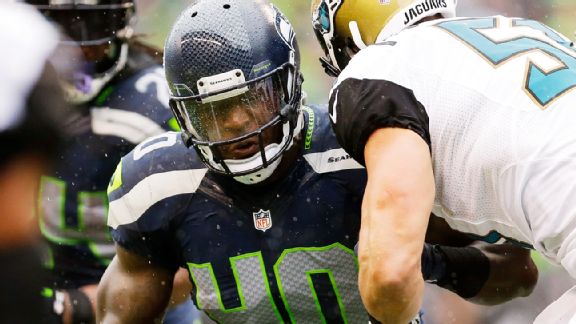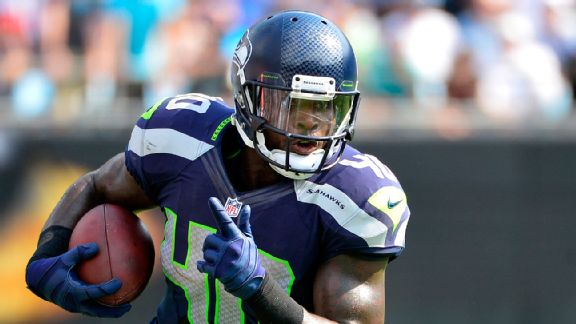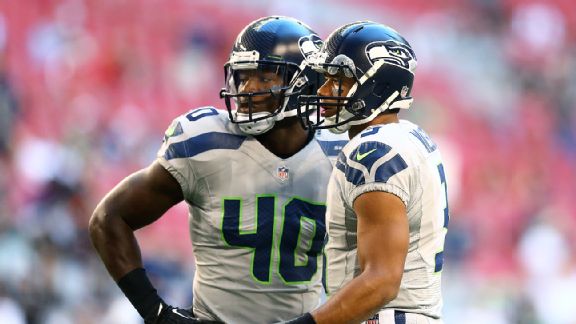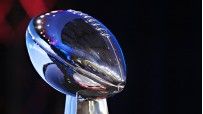Inspirasi
You don't have to hear to be able to listen!
SEATTLE -- There is a deaf football player about to play in the Super Bowl. He's the best listener on his team.
Seconds after the Seahawks won the NFC Championship, Derrick Coleman stood inside delirious CenturyLink Field -- noise swirling like confetti -- and felt only vibrations. But he read every lip he could. He read Pete Carroll's "Attaboy"s and Russell Wilson's "We did it"s and even Richard Sherman's "I'm the greatest." His world is quieter than everyone else's, but don't mistake that for weakness. He misses nothing. His survival skill is concentration. Give him a clear view, and he can tell you what the referee is whispering about under the replay hood. This isn't a handicap; this is progress.
The first deaf player in NFL history was defensive tackle Bonnie Sloan, a 1973 member of the St. Louis Cardinals who thought it was fortuitous that he didn't have to hear his coaches curse. The second was defensive end Kenny Walker, aDenver Broncos 1991 draft pick out of Nebraska, who was so thorough he used to bring an interpreter with him to team meetings.
But the third deaf NFL player has gone where none has ever gone before … to offense, where, in the 21st century there are audibles and "Omaha"s and outright races to the line of scrimmage to snap the football.
Coleman, a backup fullback for the Seahawks, is overwhelmed by none of it. When he is in the lineup, the first person he finds is quarterbackRussell Wilson. He follows Wilson to the huddle. He asks Wilson to stare at him during the play call. If there's an audible under center, he expects Wilson to turn around and mouth it to him loud and clear. If Wilson forgets, he'll go grab the quarterback's face mask. That's his other survival skill: whatever it takes.
It's simple, actually: You don't have to hear to be able to listen.
 AP Photo/Ted S. WarrenSeattle's Derrick Coleman doesn't get a lot of attention as a fullback, but he's still made a lot of fans.
AP Photo/Ted S. WarrenSeattle's Derrick Coleman doesn't get a lot of attention as a fullback, but he's still made a lot of fans.Elementary school can be the cruelest place on earth. The truth is spoken there, for better or worse, and one of the first taunts Coleman received in grammar school was: "Hey, Four Ears."
His parents, Derrick Coleman Sr. and May Evans, had been dreading that moment ever since an Orange County, Calif., specialist told them their 3-year-old son was virtually deaf in his left ear. Doctors explained that young Derrick was a genetic anomaly. Derrick Sr. and May could hear normally, but each was missing a hearing gene -- which meant their son's hearing was in gradual decline.
First, the left ear went entirely, then the majority of the right. By elementary school, he wore two bulky hearing aids, which helped amplify sounds. The upside, at first, was that he could hear again. "You could see his eyes lighten up," May says. But the downside was that he was fair game to all the smart alecks in his first-grade class.
His response was to ignore anyone who was rude or simply turn the volume down on his hearing aids. "That's the one good thing about having 'em," Coleman says. "You guys have to actually listen when somebody's talking. I just turn 'em off."
But the more he tuned out the world, the more the world pushed back. When he was about 9, he was attacked at a playground, according to May, by five children. "[They] double-teamed him and jumped on him because he was different," she says.
His sister found him wandering the park, searching for the hearing aids that had been ripped out. A furious May went door-to-door, found the attackers and warned their parents that the next time she'd press charges. Derrick Sr. claims he was in "sheer anger." But young Derrick quietly went back to his room … to do push-ups.
Football, as is often the case, was the great equalizer. Whereas Derrick was once the shy, disengaged deaf kid, he soon became the kid most likely to make a tackle.
It didn't happen overnight, but there was value in the journey. In the seventh grade, he had begged his parents to let him play Pop Warner football, and, at first, May, a nurse, resisted because of the hearing aid issues. She worried they would come flying out on impact -- which would turn out to be correct -- and she was wondering, too, whether collisions could damage his hearing even more.
Derrick Sr. pushed to let him play, convinced that football would be his son's ticket to normalcy. Derrick Sr. had always feared that, in response to the heckling, young Derrick would resort to using his fists. Football was the better alternative, he felt, and May let their pediatrician decide.
The pediatrician ordered an MRI to examine the bone structure in young Derrick's inner ear, and his conclusion was that football would not damage Derrick's hearing any further.
"What football did was save my life," Coleman says. He already had begun to read lips with the help of his audiologist, but football inspired him to master lip reading sooner and at a more expert level. He knew coaches would be yelling. He knew quarterbacks would be panicking. He had to be able to focus, stare at their mouths and translate swiftly.
The hearing aids could do only so much. At that time, in the early 2000s, his hearing devices were bulkier and not as amplified. "If we go on a scale of zero to 10, with 10 being what normal people hear, without my hearing aids, I'm about a one, one and a half,'' Coleman says. "But with hearing aids when I was younger, I was more like a six or seven."
But his "six or seven" would dip lower, he says, when there was the accompanying mayhem of the football field. Teammates were wearing mouthpieces. They were speaking in incomplete, garbled sentences. In his brain, all of that noise morphed into an undecipherable hum. Pop Warner coaches didn't trust him at first. They stuck him on the offensive and defensive line. They didn't realize that, for a lip reader, it's more difficult to understand someone when they're shouting and twitching. And the coaches were doing a lot of shouting and twitching.
But football still boils down to blocking and tackling, and young Derrick was usually the most ripped physical specimen on the field, not to mention the most fearless. There was only one glitch. May would see him digging through the grass to find his hearing aids after he leveled some opponent. So she fixed that by designing a pantyhose skull cap to keep his earpieces from falling off.
"Football gave him self-esteem he never would have had," Derrick Sr. says. "After he got to prove himself, he was no longer picked last -- he was picked first. Because now everybody knows this kid. 'Oh, that kid? Yeah, Derrick with the hearing aids. Yeah, he's a great player.' So, he found his niche in life early on."
The only question was: Could this be his niche in life later on?
 Bob Donnan/USA TODAY SportsFootball inspired Derrick Coleman to master lip reading sooner and at a more expert level.
Bob Donnan/USA TODAY SportsFootball inspired Derrick Coleman to master lip reading sooner and at a more expert level.Until he arrived at Troy High School in Fullerton, Calif., his football existence was a rugged three-point stance, watching and waiting for the ball to be snapped -- and then plowing anything in his path.
But the high school coaches at Troy, after watching him run, had a novel idea: Give him the ball.
He was 200 pounds, instinctive, athletic, blazing fast, and, better yet, had a chip on his shoulder. The coaches didn't know his entire history -- like having been pummeled at a park for being different -- but they were unconcerned about his impairment.
"There really wasn't a buzz about the hearing," says then-assistant coach Kevin Hastin. "If you didn't see the hearing aids, then you really wouldn't know about the impairment. 'Cause he reads lips so well. If you're directly looking at him, he can communicate with you almost perfectly."
The main advice his mother had given him was to stop at nothing to understand the play. As a tailback, he would almost always line up behind the quarterback, which meant he would not be able to see the QB's face or the QB's lips. This was trouble, and he would need to fix the problem.
"I told him, 'If you can't hear what your quarterback is saying, you need to push your way through to the front," May says. "And you need to stand right there by them. And if you can't hear them, you grab them and you tell them to repeat themselves."
It must have gone well, because, when Coleman's sophomore year began, he was Troy's starting tailback. The poignant moment was not lost on his parents, who settled into their seats for the season opener and prayed for greatness.
Coleman's first carry was a fumble. Later in the first half, he fumbled again. Then again.
Maybe it was too much to expect a deaf kid to lip read the play call, lip read the audibles, keep one eye on the center snap, keep one eye on the defense -- and not come unglued. He'd never before played a varsity game of tailback in his life. What were the odds he'd survive it?
But here's what happened in the second half -- three touchdowns by Coleman, no fumbles and a sense that somebody down there was special.
"Most kids would be down and out [at halftime]," Hastin says. "They'd go into the tank. But Derrick didn't. We kept giving him the ball, and he overcame that game. It's kind of a snapshot of who Derrick is."
By his senior year in 2006, he was considered one of the elite running backs in Southern California. San Diego State recruited him first, followed by UCLA and then big, bad USC -- led by their rock-star head coach Pete Carroll. The Trojans had always been Coleman's favorite team, but Carroll and his scouts saw barrel-chested Coleman as a fullback in their system. UCLA, on the other hand, wanted him as a tailback. Coleman signed in Westwood.
To the college coaches who were pursuing him, the hearing impairment seemed a non-issue. Troy's coaches assured all of the recruiters that Coleman had, in many ways, turned his disability into a plus. First of all, they said he paid attention five times more than the average player. He was so tuned in, they said, that in one high school game, he had eyeballed an opposing head coach calling out "Sweep!" to his quarterback. From 50 yards away, he had read the man's lips. It was fourth-and-1. Coleman told his defensive coordinator. The Troy defense stuffed the sweep.
Hmmm, the UCLA coaches thought when they heard that, maybe we've got something here.
 Mark J. Rebilas/USA TODAY SportsColeman connected with quarterback Russell Wilson to make sure he knew what Wilson was communicating.
Mark J. Rebilas/USA TODAY SportsColeman connected with quarterback Russell Wilson to make sure he knew what Wilson was communicating.The Bruins never did use him as a spy. But they played him at tailback, as promised, and he rewarded them with a four-year total of 1,780 yards and an average of 5.2 yards per carry. He went the wrong way only once, on a screen pass, and it wasn't because he didn't hear the play call.
Otherwise, his UCLA career was fairly nondescript -- unless you want to count the time he almost ripped out his own quarterback's face mask.
"Well, I need to know the play," Coleman says. "So there was one time in college where he was tellin' everybody his play, and he went back to hike it, and he didn't tell me. So I just ran up there and I grabbed him by [the mask] and just pulled him around, like, 'Hey, what's the play!'"
Clearly, he took football seriously. He told coaches he enjoyed special teams as much as he enjoyed offense. NFL scouts began to sniff around. He was 5-foot-11, 230 pounds, with a personal best of 4.46 seconds in the 40-yard dash. His hearing impairment didn't seem to be an issue anymore. He was projected as a late-round pick in the 2011 draft. He made sure to turn his hearing aids up on draft days 1, 2 and 3. This, he was going to hear.
But it was 72 hours of absolutely nothing. The phone calls never came until the draft was ending -- from teams lining up to sign him as an undrafted free agent. His parents will tell you that when their son grows quiet, it means he's fairly upset. And when he looks away from you, it means he's borderline livid -- because no one looks people more in the eye (or in the mouth) than Derrick Coleman.
He was fuming that day, and although he's still not exactly sure why he was bypassed, his mother will say what everybody was thinking:
"In the back of my mind, I kind of thought it was because of his hearing," she says. "They still don't get it. They still don't understand it does not affect his play. And so, yeah, that was the heartbreak. Like, they still don't get it."
He soon became an experiment of the Minnesota Vikings, who signed him to their 2012 practice squad. But he was cut early in the 2012 season, and, according to close friends, it was due to his recurring fumbles, not anything with his hearing.
He returned home to Fullerton, where his former high school assistant, Kevin Hastin, had become Troy's new head coach. Hastin invited him to join his staff, which was symmetrical, in a way. The last time Coleman had had a fumble issue, it had happened at Troy. And after the Minnesota fumbles, he was back at Troy again, around people who believed.
The entire high school season, he continued to work out. And by the end of 2012, just like old times, Pete Carroll was on the phone.
Now the Seahawks head coach, Carroll was recruiting him a second time as a fullback. Carroll had a shortage of blocking backs, and his scouts still considered Coleman a player to keep an eye on. Carroll invited him up for a workout, unsure if Coleman's hearing defect would emerge as a hindrance. "At first, you know, we weren't sure," Carroll says. "I had recruited him in high school, so I knew him. But we weren't sure how it was going to factor in because I never got a chance to coach him."
Carroll would commit to signing him only to his 2012 practice squad, with the promise of a second look during 2013 training camp. That gave Coleman time to cozy up to Russell Wilson.
If he was going to make the team, he needed the quarterback to have his back. He couldn't afford to confuse any play calls, audibles or verbiage. He was not going to give Carroll an excuse to cut him. He sat next to Wilson in team meetings and in the locker room. He told Wilson his story. The quarterback was all in.
"I just always engage, always know that he's there," Wilson says. "And I kinda love it. You get to make sure that you're talking to him and he understands the play, he understands the snap count."
In the 2013 preseason opener against San Diego, Coleman caught a touchdown pass. He made no glaring errors during the entire exhibition season, and Carroll rewarded him with the starting fullback job on opening day. "He's come to us in a big way," the coach says.
In October, he injured a hamstring, and lost his starting job to Michael Robinson. But he kept tagging along behind Wilson. Then, during a home Monday night game against the Saints, in arguably the loudest stadium in the league, he entered the game with his ears humming. The Seahawks were inside the Saints' 10-yard line in the third quarter, and the crowd noise once again rendered his hearing aids null and void. He heard nothing as he ran a pass pattern in the flat. Wilson threw instead to tight end Kellen Davis, but the ball careened off Davis' helmet right toward Coleman.
There were no distractions. He heard no one say "Drop it," or "Catch it," or "Look out, Four Ears.'' Sometimes being deaf has its benefits, and, in the blink of an eye, Derrick Coleman's main survival skill -- concentration -- helped him score his first regular-season NFL touchdown.
He couldn't hear the applause.
But he listened to it.
SUMBER TULISAN
http://espn.go.com/nfl/playoffs/2013/story/_/id/10372203/super-bowl-xlviii-deafness-deter-seattle-derrick-coleman
Iklan DURACELL yang dibintangi Derrick








0 comments